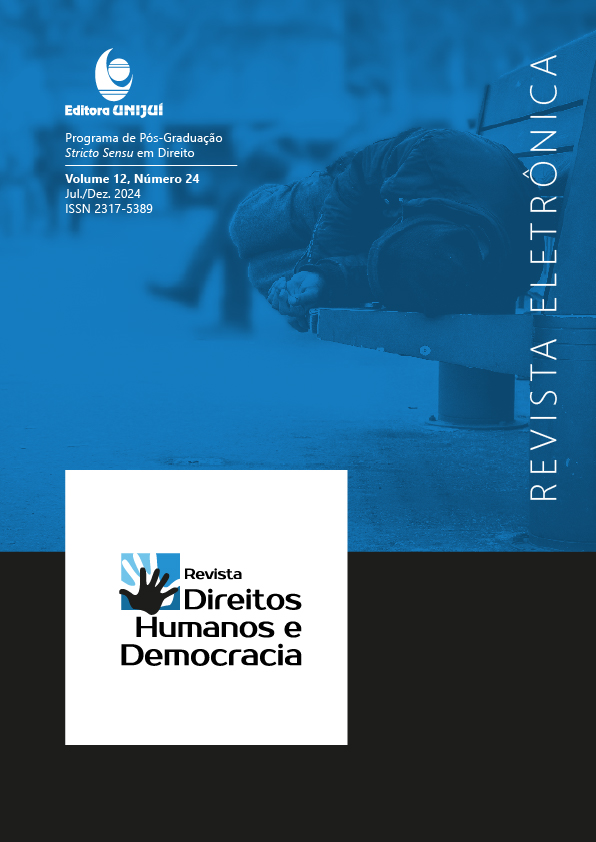Human rights and neoliberal barbarism
DOI:
https://doi.org/10.21527/2317-5389.2024.24.16155Keywords:
State, Capitalism, RightsAbstract
The article examines human rights within the political-economic context of neoliberal theory. Its aim is to discuss the challenges to the effectiveness of human rights amidst the unchecked fervor of neoliberalism, with a particular focus on the effects on vulnerable individuals, especially those with disabilities. Initially, it addresses the rise of neoliberal politics, presenting its general harms and the role of the state in alignment with capital. It then discusses human rights and the challenges of their maintenance and effectiveness in a neoliberal society. Finally, it highlights the vulnerabilities of people with disabilities and the systemic cruelty of the economic system against those who lack the strength to defend themselves against its relentless impact. The research has a theoretical perspective, presenting fundamental concepts of neoliberalism and human rights, and is complemented empirically with statistical data on the effects of the economic system, demonstrating the lack of respect for human rights and the substantive effectiveness of democracy. The study follows a hypothetico-deductive method by relating neoliberal practice to the barbarity applied against human rights, particularly those of people with disabilities and their vulnerability.
References
AGUILLAR, Fernando Herren. Direito econômico: do direito nacional ao direito supranacional. São Paulo: Atlas, 2019.
BOBBIO, Noberto. Estado, governo, sociedade; por uma teoria geral da política. Rio de Janeiro: Paz e Terra, 2007.
BONAVIDES, Paulo. Teoria constitucional da democracia participativa. São Paulo: Malheiros Editores, 2001.
BONAVIDES, Paulo. Do Estado Liberal ao Estado Social. São Paulo: Malheiros Editores LTDA, 2007.
BONAVIDES, Paulo. Teoria Geral do Estado. São Paulo: Malheiros Editores Ltda., 2012.
BOLZAN DE MORAIS, Jose Luis; STRECK, Lenio Luiz. Ciência política e teoria do estado. Porto Alegre: Livraria do Advogado, 2014.
BRASIL. [Constituição (1988)]. Constituição da República Federativa do Brasil de 1988. Brasília, DF: Presidência da República. Disponível em: https://www.planalto.gov.br/ccivil_03/constituicao/constituicao.htm. Acesso: 06 set. 2024.
BRASIL, 2017. Lei nº 13.467, de 13 de julho de 2017. Disponível em: https://www.planalto.gov.br/ccivil_03/_ato2015-2018/2017/lei/l13467.htm. Acesso em: 07 de jul. de 2024.
BRASIL. Ministério dos Direitos Humanos e da Cidadania – MDHC (Portaria nº 571, de 11 de setembro de 2023). ObservaDH - Observatório Nacional dos Direitos Humanos, 2024. Disponível em https://experience.arcgis.com/experience/6a0303b2817f482ab550dd024019f6f5/page/Pessoas -com-defici%C3%AAncia/. Acesso em: 07 de jul. de 2024.
BRASIL. Agência IBGE Notícias. Pessoas com deficiência têm menor acesso à educação, ao trabalho e à renda. 2023. Disponível em: https://agenciadenoticias.ibge.gov.br/agencia-noticias/2012-agencia-de-noticias/noticias/37317-pessoas-com-deficiencia-tem-menor-acesso-a-educacao-ao-trabalho-e-a-renda. Acesso em: 14 abr. 2024.
BRASIL. Instituto Nacional de Estudos e Pesquisas Educacionais Anísio Teixeira. Resumo técnico do Censo da Educação Superior 2022 [recurso eletrônico]. – Brasília, DF: Inep, 2024.
BRASIL, Lei n. 13.146, de 06 de julho de 2015. O Estatuto da Pessoa com Deficiência. Disponível em: https://www.planalto.gov.br/ccivil_03/_ato2015-2018/2015/lei/l13146.htm. Acesso em: 14 abr. 2024.
BRASIL. Decreto no 591, de 6 de julho de 1992. Atos Internacionais. Pacto Internacional sobre Direitos Econômicos, Sociais e Culturais. Promulgação. Disponível em: https://www.planalto.gov.br/ccivil_03/decreto/1990-1994/d0591.htm. Acesso em 05 set. 2024.
BRASIL. Decreto nº 6.949, de 25 de agosto de 2009. Disponível em: https://www.planalto.gov.br/cciviL_03/////_Ato2007-2010/2009/Decreto/D6949.htm. Acesso: 06 set. 2024.
CHOMSKY, Noam. O lucro ou as pessoas? Neoliberalismo e ordem global. Editora Bertrand Brasil, 2002.
DINIZ, Debora; BARBOSA, Lívia; SANTOS, Wederson Rufino dos. Deficiência, direitos humanos e justiça. Sur. Revista Internacional de Direitos Humanos, v. 6, p. 64-77, 2009.
HARVEY, David. O neoliberalismo. História e implicações. São Paulo: Loyola, 2008.
MASCARO, Alysson Leandro. Crítica da Legalidade e do Direito Brasileiro. São Paulo: Quartier Latin, 2003.
ONU. Comissão de Direitos Econômicos, Sociais e Culturais. Situação das ratificações. Disponível em: https://www.ohchr.org/en/treaty-bodies/cescr. Acesso em: 06 set. 2024.
OXFAM, BRASIL. O 1% mais rico do mundo embolsou quase duas vezes a riqueza obtida pelo resto do mundo nos últimos dois anos. Disponível em: https://www.oxfam.org.br/noticias/o-1-mais-rico-do-mundo-embolsou-quase-duas-vezes-a-riqueza-obtida-pelo-resto-do-mundo-nos-ultimos-dois-anos/#:~:text=O%201%25%20mais%20rico%20do%20mundo%20ficou%20com%20quase%202,metade%20de%20toda%20riqueza%20criada. Acesso em: 07 de jul. de 2024.
PIOVESAN, Flávia. Direitos humanos e o direito constitucional internacional. São Paulo: Saraiva, 2013.
STIGLITZ, Joseph E. Povo, poder e lucro: capitalismo progressista para uma era de descontentamento / Joseph E. Stiglitz; tradução Alessandra Bonrruquer. Rio de Janeiro: Record, 2020.
Downloads
Published
How to Cite
Issue
Section
License
Copyright (c) 2024 Human Rights and Democracy Journal

This work is licensed under a Creative Commons Attribution 4.0 International License.
By publishing in the Revista Direitos Humanos e Democracia, authors agree to the following terms:
Articles are licensed under the Creative Commons Atribuição 4.0 Internacional (CC BY 4.0), which allows:
Share — copy and redistribute the material in any medium or format;
Adapt — remix, transform, and build upon the material for any purpose, including commercial use.
These permissions are irrevocable, provided the following terms are respected:
Attribution — authors must be properly credited, with a link to the license and indication of any modifications made;
No additional restrictions — no legal or technological measures may be applied that restrict the use permitted by the license.
Notices:
The license does not apply to elements in the public domain or covered by legal exceptions.
The license does not grant all rights required for specific uses (e.g., image rights, privacy, or moral rights).
The journal is not responsible for opinions expressed in the articles, which remain the sole responsibility of the authors. The Editor, with the support of the Editorial Committee, reserves the right to suggest or request modifications when necessary.
Only original scientific articles presenting research results of interest, not previously published or simultaneously submitted to another journal with the same purpose, will be accepted.
References to trademarks or specific products are intended solely for identification purposes and do not imply any promotional endorsement by the authors or the journal.
License Agreement: Authors retain copyright over their articles and grant the Revista Direitos Humanos e Democracia the right of first publication.













